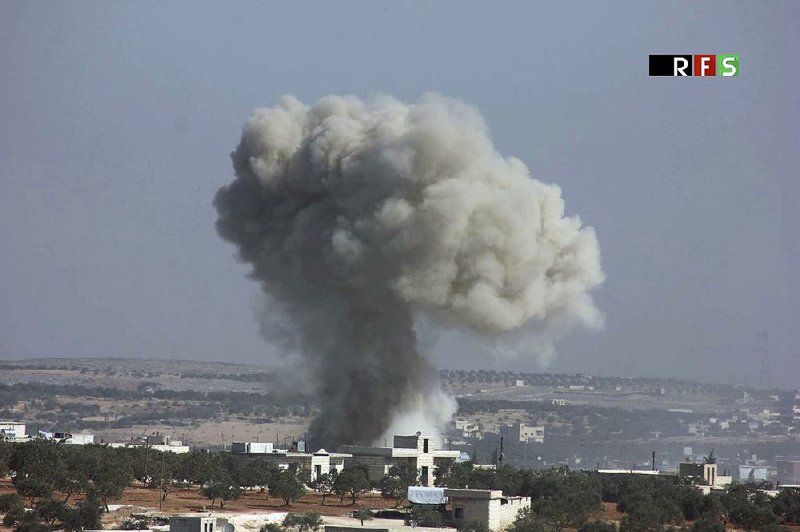BEIRUT -- U.N. Secretary-General Ban Ki-moon called Thursday for an immediate investigation of an attack on a school in Syria's Idlib province that the U.N.'s children's agency is calling one of the deadliest of its kind in the country's six-year war.
UNICEF raised its toll for Wednesday's attack to 28 dead -- 22 children and six teachers. The Syrian Civil Defense first-responder team and the Britain-based Syrian Observatory for Human Rights said Thursday that the airstrikes killed at least 35 people, mostly children.
The Observatory said 15 students were killed, as well as four teachers and three other women. It was not immediately possible to reconcile the separate figures, but divergent death tolls are not uncommon in a conflict-torn Syria that has been largely inaccessible to international journalists for more than two years.
UNICEF and the Syrian Civil Defense said the death toll is likely to rise as rescue efforts continue.
Ban said in a statement that the attack, carried out against rebel-held territory, may amount to a war crime if found to be deliberate.
"If such horrific acts persist despite global outrage, it is largely because their authors, whether in corridors of power or in insurgent redoubts, do not fear justice. They must be proved wrong," he said.
Witnesses said jets targeted the school in the town of Hass as many as 10 times, around midday Wednesday. Opposition activists blamed the strikes on Russian and government planes.
Idlib is the main Syrian opposition stronghold, though radical militant groups also have a large presence there. It has regularly been hit by Syrian and Russian warplanes as well as the U.S.-led coalition targeting Islamic State militants.
The Russian military denied responsibility, calling the accusations a "sham."
Russian Defense Ministry spokesman Maj. Gen. Igor Konashenkov said a Russian drone flew over the school building on Thursday and found its roof intact and no bomb craters around it.
Russian warplanes didn't fly over the area the previous day, Konashenkov said.
UNICEF Executive Director Anthony Lake called the airstrikes an "outrage."
"This latest atrocity may be the deadliest attack on a school since the war began," Lake said in a statement. "When will the world's revulsion at such barbarity be matched by insistence that this must stop?"
Juliette Touma, regional UNICEF chief of communication, said Wednesday's attack was the deadliest attack on a school in 2016, raising the overall death toll of children killed in such attacks in 2016 to 54.
According to Touma, 591 children were killed in 2015 in Syria.
Before Wednesday's attack, the deadliest assault on a school was reported in April 2014 when 30 children were killed in airstrikes that hit a school in the rebel-held part of Aleppo city, according to UNICEF.
UNICEF said it has verified at least 38 attacks on schools this year across Syria, whether in government-held areas or rebel-controlled territory, compared with 60 attacks last year.
"In general there are one in three schools in Syria that can't be used anymore because they were damaged or destroyed or used for military purposes or sheltering the displaced," Touma said, speaking from Amman, Jordan.
UNICEF said more than 1.7 million Syrian children remain out of school in 2016, down from 2014 when 2.1 million were recorded as not attending classes. The U.N. agency said another 1.3 million are at risk of dropping out this year. In the rebel-held part of Aleppo, teachers and volunteers have set up underground schools to ensure some classes continue during a punishing bombing campaign and a siege that has tightened since July.
In other developments Thursday, U.N. official Jan Egeland, speaking in Geneva, said efforts will be renewed to secure the evacuation of nearly 200 wounded from eastern Aleppo districts, and allow medical and food supplies into the besieged part of the city.
Airstrikes by Russian and Syrian government planes on Aleppo have been halted for nine days now in expectation of the evacuations, but efforts have failed because Syrian rebels say there have been no safety guarantees for the evacuees. The rebels also say Russia and the government are not allowing aid into the Aleppo districts that are home to some 275,000 people.
A government ground offensive attempting to push into the rebel-held part of the city, and airstrikes in rural Aleppo have continued.
Egeland said a lack of trust, fear, and misunderstandings, as well as unacceptable preconditions, have prevented evacuations.
"We are not giving up," Egeland said.
However, he said the Syrian government has denied humanitarian access to eastern Aleppo as part of a monthly U.N. plan to access 25 besieged and remote areas in Syria.
"We need to overturn that decision because east Aleppo needs humanitarian supplies, they need it urgently," Egeland said. "If not ... it will be the worst winter in now the six winters we have had in the conflict."
Separately, Turkish President Recep Tayyip Erdogan said Thursday that he had informed President Barack Obama of Turkey's intent to participate in an offensive in northern Syria.
In a televised speech from Ankara, Erdogan said he told Obama that Syrian rebels backed by Turkey in an ongoing operation called "Euphrates Shield" would advance on the Syrian border town of al-Bab, which is held by the Islamic State group.
They would then march on to Manbij, a northern Syrian city that earlier this year was liberated from the Islamic State by a coalition of Syrian militias led by a Kurdish faction known as the People's Protection Units. The Turkish government considers the Protection Units an affiliate of the outlawed Kurdistan Workers' Party, a Kurdish separatist faction that has waged a decades-long insurgency within Turkey and is deemed a terrorist group by both Ankara and Washington.
Then, Erdogan said, "we will go toward Raqqa" -- the declared capital of the Islamic State in Syria.
Information for this article was contributed by Sarah El Deeb of The Associated Press and by Ishaan Tharoor of The Washington Post.
A Section on 10/28/2016

